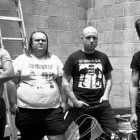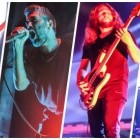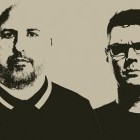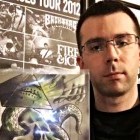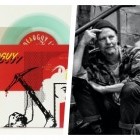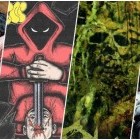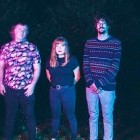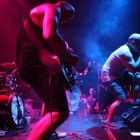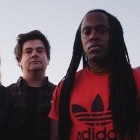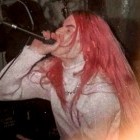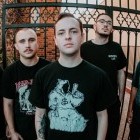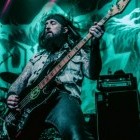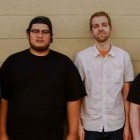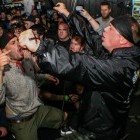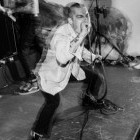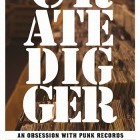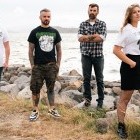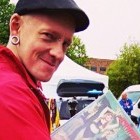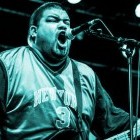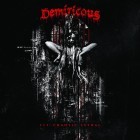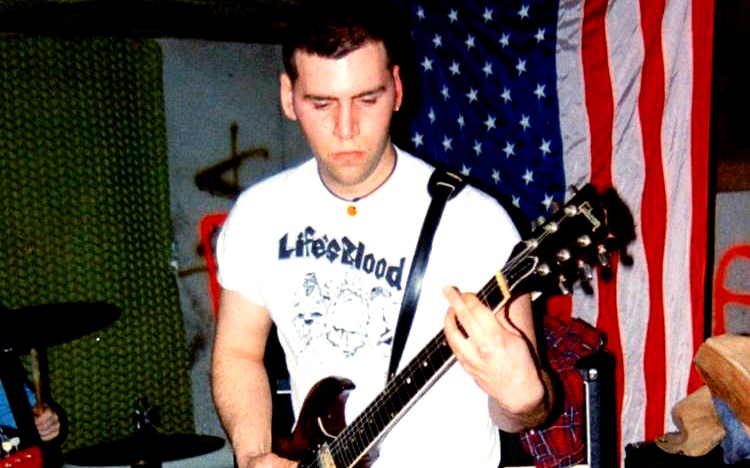
I first crossed paths with Mark Telfian was playing guitar in Eucharist in the mid-'90s, but I kept up with his discography up to his time in Limp Wrist. Throughout the years, the New York state native has also played in such bands as Conniption, Devoid of Faith, and Hail Mary. An openly gay musician who has been part of the hardcore scene for decades now, I was really excited to interview Mark about his career and life.
Tell me a bit about your upbringing.
I was born and raised in upstate New York in the suburbs of Albany (a small town called Rexford). My parents were both teachers, and my father had a painting business that he did in the summers that from a young age, my brothers and I worked at. I was the youngest of four boys and my older brothers exposed me to things I might not have experienced until I was older.
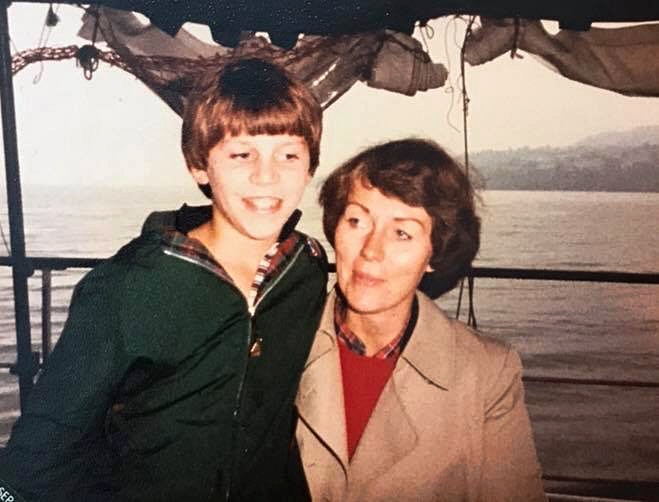
What kind of music did you find yourself drawn to at a very young age?
I was always drawn to the heaviest music I could come across. My brothers got me into Credence, Led Zeppelin, and The Who from an early age. From there I progressively got more and more into heavy and faster music. When I was in sixth grade, I discovered the Sex Pistols and The Clash. Back then, it was very difficult to find underground music, so I became a regular at the record store: strawberries, music shack and worlds records. I started watching Night Flight on USA network in 7th grade, which exposed me to the hardcore that was happening in the bigger cities. From there it snowballed into finding more underground music.
What was your first rock concert, and what memories stick out from the experience?
My first concert was the Beach Boys at SPAC (Saratoga Performing Arts Center). I went with my family and the entire time I thought that it sucked and that I hated that it was a music family event [laughs]. Liking the same music as my parents was a total turn off.
Musically speaking, how did you discover the “hard stuff” as a teen? Did you have an older mentor who showed you the way, or were you the guy within your group of friends who everyone looked to for that kind of thing?
As I was saying earlier, the TV program Night Flight, combined with the local record stores and my brothers all helped me get into the heavier stuff. Being in upstate New York, the culture from New York City was always leaking into our quiet suburban environment. I took hold on the little pieces I saw and ran with it. From someone on my hockey team being into the sex pistol to kids at my school getting into more mainstream punk bands; I was always attracted to the counter cultural elements I saw. NYHC was making its way upstate in ‘86 and the first show I saw was Beastie Boys with Murphy’s Law.
The closest older mentor was my older brother, Brad, who would drive me to shows in Albany which was about 30 minutes from where we lived. That was about 87- 88 and I was lucky to enough to get to see pretty much every NYHC band I could have wanted to see (Warzone, Project X, Life's Blood, YOT, Beyond, Breakdown, etc). At that time, Albany had a huge hardcore scene, and from ’89 on I was able to start driving to shows myself.
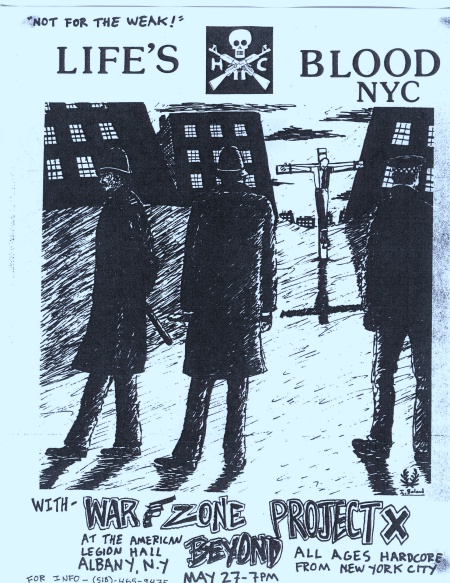
What was the first band you played in, and did you guys do much?
The first band I played in was called Drawback and we started in the fall of 1988. We played one show with Token Entry, and we had a poorly-recorded boombox six-song demo. I sang because I couldn’t play any instruments at that time, even though I owned a guitar [laughs].
Tell me about the band Fäctøry and how you came to be a member? Also, was it always meant to be a one-off?
I had met Jason O’Toole in Albany through the fanzine I was doing called Trial by Error. I was a huge Life’s Blood fan and did an interview with him for my zine after Life’s Blood had disbanded. In the process of the interview, he mentioned that he wanted to reform his former band Life’s Blood and asked if I would be interested in playing in the new lineup. I was so excited that I lied to him and said I played guitar (because it was the only instrument I owned). I asked him what songs he wanted to practice first and then had my friend Jim Kopta teach me those songs and played them over and over until I could actually play them.
Somewhere along the line, Sam McPheeters and Adam Nathanson contacted Jason and said that he couldn’t restart Life’s Blood as he had no right to the band or the songs. Jason and I then hatched the idea of starting a new band, which later became Fäctøry. I practiced over and over until I could write songs, even though I had no idea how to play guitar. Everything was always based on sound.
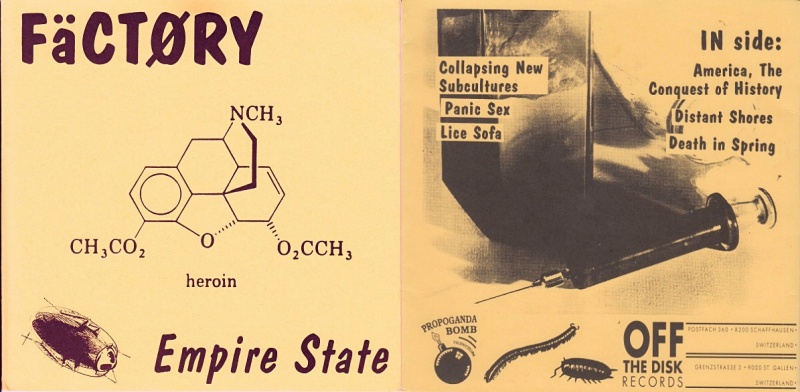
Fäctøry did one record for Off-the Disk and a double split 7 inch on Framework with Scapegrace, Man is the Bastard, and Campaign. We played about 15 shows in the Northeast with bands such as MDC, Born Against, Black Train Jack, 1.6 Band, Scapegrace, Dropdead, Monster X, and Disrupt. The band fizzled out pretty quickly, but it was never really meant to last in the first place. The O’Toole brothers quit the band and that helped begin my next band Conniption.
OK, yeah, tell me about Conniption. It was a short-lived yet band that also featured Devon Cahill (Dropdead, Monster X).
Connipiton formed out of Fäctøry and was originally called Amongst Ourselves. It started as a three-piece with Tony Trahan, Joe Keiser (now of Skinless fame), and myself. Tony and I had a falling out with Joe, so we kept going but then recruited Devon Cahill and Jim Kopta. We soon changed the name to Conniption. We put out three seven inches: a split with Halfman, a split with Scapegrace, and a self-titled seven inch. Conniption was around for about a year, we toured the East Coast and played many shows in the Northeast. We opened for bands like Rancid, Spitboy, Dropdead, Citizen Fish, and Copout, among many others. After a year, Tony sort of lost interest in the band and we kind of fell apart from there. Devon was already in two other bands (Monster X and PNA (Post-Natal Abortion), so it was just over.
The next band I know you from is Devoid of Faith, which released a bunch of great records, but you only appeared on one.
I was recruited for Devoid of Faith essentially because I owned a van [laughs]. Nate Wilson was a killer guitar player and at that point it was hard to keep up with him. The seven-inch I played on was badly out of tune and I think most people in the band would rather it be forgotten. I played a handful of shows with them in the Northeast for about six months. Interpersonal drama lead to my exit of the band on bad terms. It wasn’t until years later we were able to mend old wounds and rebuild bridges. They went on to be a great band that was influential to many other bands, and they were definitely better off without me.
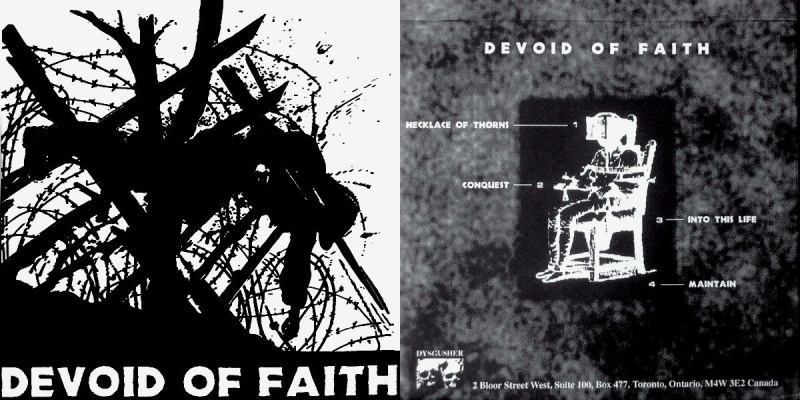
Eucharist was a grindy Richmond, VA-based that released one record in 1996 before splitting up. I remember seeing you guys play a show on Long Island and then it seemed like you guys just disappeared.
When I moved to Richmond from upstate New York, I came from a scene that played faster hardcore and at that time Richmond was a scene based on Avail and other poppy bands. Being someone that never really got into pop-punk, I found it a rough transition. I had some friends that moved here from Pennsylvania, they were into similar hardcore like I was, and they introduced me to two guys that had just moved here from the outer banks: Colby Long and Chris Stein. They had a friend who wanted to sing and was pretty open to try something different.
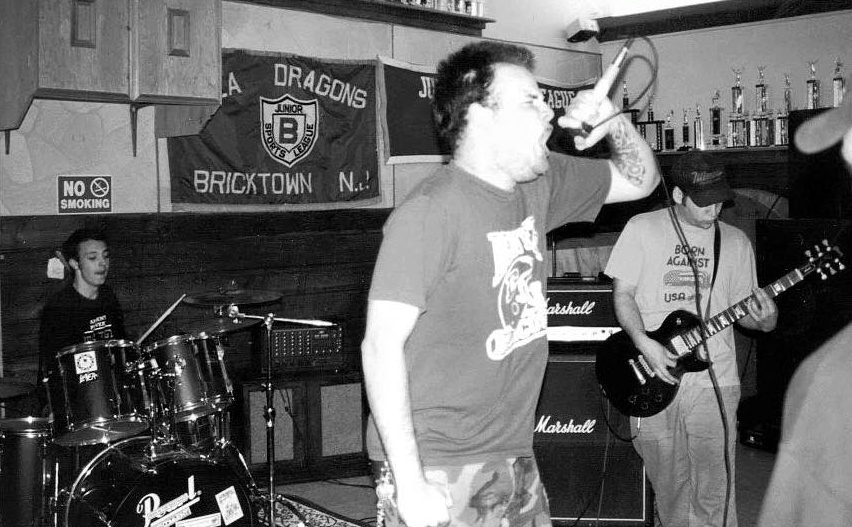
Eucharist also had four compilation songs, two on Nothings Quiet on the Eastern Front, one on A Double Dose of Dicks, and one on the Vida comp.
That was the also the time period my former Black Army Jacket bandmate, Dan Crowell, worked with you in the band Hail Mary. That one found you handling lead vocals. What was the genesis of that group?
Well, as Eucharist was fizzling out, I found out Dan Crowell was going to be going to college near my parents house in upstate NY. I was getting a little sick of Richmond at that point, so I decided to move back to Rexford with my folks. I had always wanted to play in a band with Dan, so I asked him if I indeed moved back, would he be down to start a band. I knew his time would be limited in the band, and the idea behind Hail Mary was that myself and Jim kopta would be the back bone and main members and we would get fill-in drummers or bass players so we could try and tour more extensively.
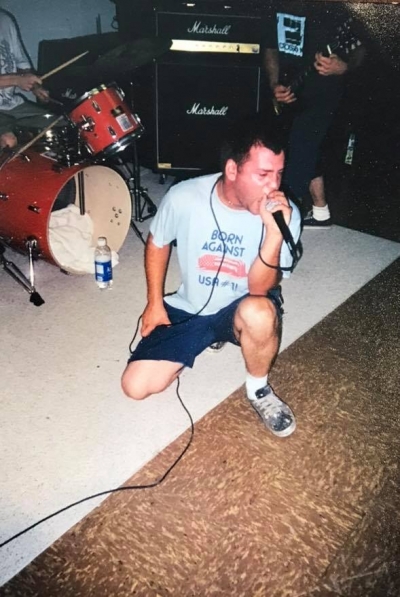
What’s the story behind By the Throat, the hardcore band you were in with Nate Wilson (Devoid of Faith, Monster X), Paul Henry (Limp Wrist, Exit Order), and John Moran (Monster X). When I interviewed Nate in 2016, he said the group didn’t last longer because you and John had some kind of falling out.
Nate was (and still is) one of my best friends. I joined the band after it had already started. I played bass. It was always a lot of fun playing with Nate, but I never really liked John's vocals. I also think John was always weird with me because I was gay. We did a 7" and played a couple of shows, but nothing much came of it.
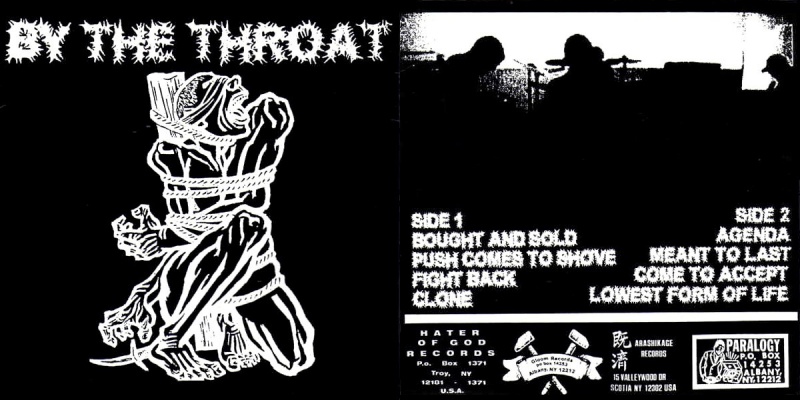
Starting in the mid-‘90s, and into the early ‘00s, you ran a label called Paralogy. You released records by such bands as 3 Mile Pilot, Balance of Terror, and Men’s Recovery Project. Looking back, how do you feel about that time? Was it a huge headache trying to get all that done while still playing in bands and working a regular job?
Paralogy was actually the second label I’d done. I ran a label prior to that called Reek Havoc which had three releases. I really enjoyed doing a label…. loved doing trades with other labels around the US, Asia, and Europe. It gave me a chance to find new music and bands that I might not have come across. I also ran a distro so it helped me fund playing shows and doing tours. Looking back, the '90s and early '00s were a really great and easy time to release and do music.
From what I understand, the idea to form Limp Wrist came from you and Martin Sorrondeguy.
I had always felt as though gay music was only being represented by pop, folk, or emo stuff. Although I knew of gay members playing in brutal hardcore bands, there just were no all gay brutal hardcore bands. At that time, I was vegan and straight edge, and knew for sure there were absolutely no gay straight edge bands representing my lifestyle at the time. I bounced the Idea off of my buddy Nate and he thought it sounded like a great idea for a band. I then contacted Martin because we ran in the same circles, played many shows together, and he was openly out in the scene.
Martin loved the idea of doing a straight edge band that played brutal hardcore but was also over-the-top gay.
His idea at first was doing it as a project band where he would play drums and sing, and I would play bass and guitar. I, however, had a different idea... I felt like it was something that needed to exist. Something that had to be tangible, with the ability to write music, play shows, and put out records. Something that was heavy and fast, but with a gay message. I knew Andrew Martini from his bands in Philly, and knew him to be openly gay. He was a bass player, he was straight edge, and again openly gay. When I approached him he was super into the idea as well. [Drummer] Scott Moore had heard about what we trying to do and actually approached us about playing. It was a done deal.
Since Limp Wrist's members were all openly gay, was there any resistance coming the band's way when you first appeared?
We thought we would be received quite well in the DIY punk hardcore scene. At that time, it was quite a safe scene. People were very open-minded, so it was a bit of a safe zone. There were other scenes in the late '90s that were still very outwardly homophobic and I always felt it was a lost chance by not playing in spaces where we would not be readily accepted. I always wanted Limp Wrist to be a band that challenged the norm, and not just preach to the choir.
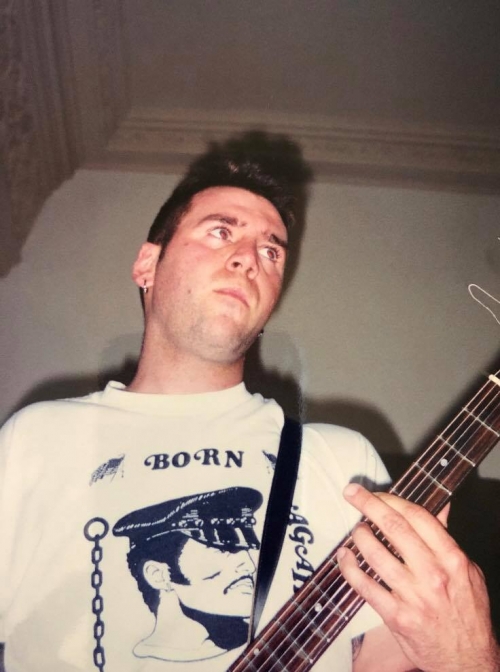
With Martin in Chicago, and you in New York, how tough was it to make Limp Wrist work from a logistical sense?
We had always known it was going to be a project band even with a full lineup. Logistically, it was very difficult to do a band with four guys living in three different cities back then. Today, with technology and everything else; its gotta be a lot easier. With two of the members living in Philly, we decided that would be our homebase for jamming. That only lasted a short time (until Scott quit after the demo). We then ended up getting Paul from Devoid of Faith on drums, and since he too was also from the Albany area, we switched to doing our practices there. Honestly though, I tried from Day One to keep the lineup as an all-gay members band. I was always disappointed and later regretted that we had went from that all-gay lineup to having a straight member. It was no longer the early vision I’d had of that all gay brutal hardcore band.
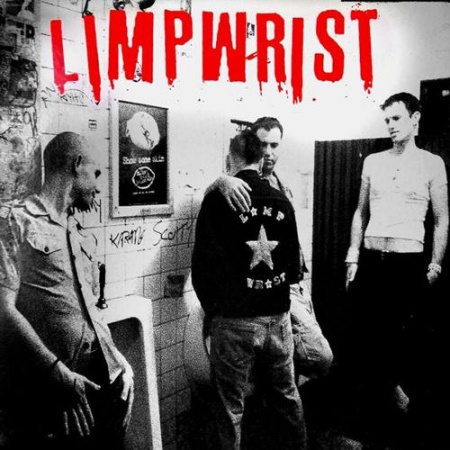
A band that shows up in your discography that I think gets overlooked is Deathsquad. This is what Nate Wilson said about the project to me: “Mark and I set out to do a band that was influenced by ABC Diabolo meets early Megadeth.”
I really enjoyed Deathsquad and wish we had done more. We actually had a full LP written, but were never able to record it (although the songs still exist on practice tapes). We did a 3-song 7" on Youth Attack Records, and a 4-song demo (which later was pressed as a 7" by Dan Barker). This was my first attempt playing guitar and singing at the same time. Nate, Dan, and I all worked together painting houses for my father. The bass player we chose to play with us was was Eric Schou who was a good friend of ours and also played in John Brown's Army with Nate. We only ever played a handful of shows. I’ve tried to convince those guys repeatedly to relearn and record the stuff because it's great, but at this point we are so spread out, living different lives, that it becomes a lot harder to do stuff like that any more.
Have you played in any bands since then? I’m sure I’ve missed something.
Dan Barker and I briefly had a band we called Alter Boy. In that band, I was just singing, Dan's brother Ned was playing guitar, and our friend Carl Harders was playing bass. Shortly after we started jamming I ended up moving back to Richmond and that kind of ended that band. I am in the process of starting a new band with friends here in Richmond.
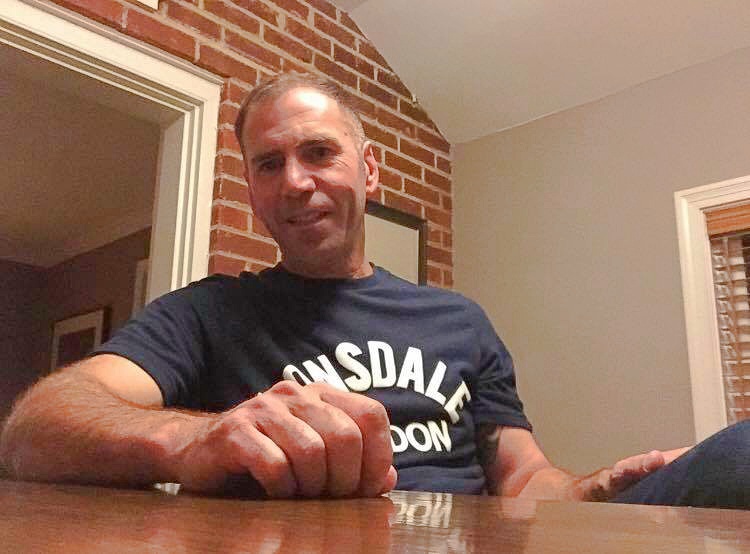
You’re back living in Richmond today. There’s a really rich hardcore and metal scene there. What are your thoughts on what’s going down there?
I’ve always felt that Richmond had a great scene with good record stores combined with cool show spaces that have kept it strong and alive. It's definitely a different scene here now then what it was when I lived here in ’94. There are a ton more bands who are playing heavy faster punk hardcore. I don't go to a lot of shows, but some of the bands that I have really gotten into more recently are Deviant, Nosebleed, and Firing Squad.
Thanks so much for doing this. For my final question, I have to give you a tough one: What is your favorite hardcore record of the ‘90s and why?
Yeah, thats a tough decision, but I would have to say His Hero Is Gone's Monuments to Thieves LP. I still listen to it almost everyday. It's one of my favorite records to run to at the gym. They are great people, and they were a great band. Their music was so brutal yet so catchy.
Tagged: conniption, deathsquad, devoid of faith, eucharist, hail mary, limp wrist

